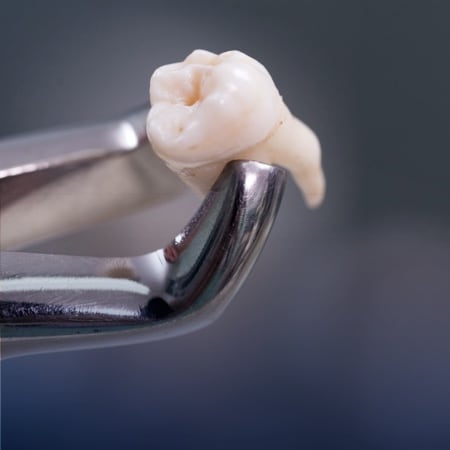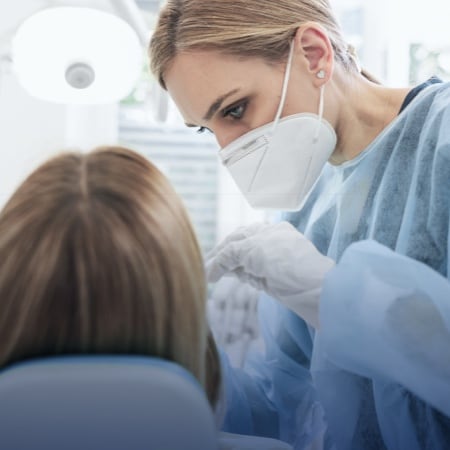Wisdom teeth, or third molars, were essential for our ancestors, whose diets required extra chewing power. Today, they often cause more trouble than they are worth.
Our modern mouths are not usually large enough to accommodate these extra teeth, leading to complications such as impaction and infection. If you’re experiencing discomfort or symptoms of infection, including pain in or around the tooth, swelling or redness of the gums, or a fever, it’s important to consult an oral surgeon as soon as possible.
What Are Wisdom Teeth?
Wisdom teeth are the final set of molars that most people develop. On average, wisdom teeth begin to emerge between the ages of 17 and 25. Not everyone will develop all 4 wisdom teeth, and some may not have any at all.
For those who do, monitoring their growth can help prevent complications like infection, which can occur if the teeth become impacted or partially erupted.
Adults typically have 32 teeth, including wisdom teeth. However, not everyone can comfortably keep all 32 teeth. Human jaws began to shrink when we transitioned from hunter-gatherer societies to sedentary farmers. With smaller jaws, wisdom teeth can begin to grow at an unnatural angle, often causing oral health problems like infections.
Signs of Infection
Knowing the signs of an infected wisdom tooth can help you seek timely treatment. Infections can occur when these teeth only partially emerge or become impacted, allowing bacteria to enter the gums.
Common indicators that an infection may be present include:
- Pain and sensitivity
- Red, inflamed gums
- Bad breath
- Difficulty chewing
- Trouble opening the mouth
- Facial swelling
- Sore lymph nodes
- Fever
If the tooth has already been removed, yellow or white discharge from the extraction site can indicate an infection.

What to Do If Your Wisdom Teeth Are Infected
If you suspect an infection, it’s important to act quickly. A wisdom tooth abscess, which can occur when an infection develops around the root of the tooth, is considered a dental emergency. The sooner you seek professional help, the less likely you are to experience serious complications.
While it may be tempting to delay a dental visit, doing so can worsen your condition and even prolong your recovery. Neglecting an infected tooth can lead to serious consequences, including the spread of infection to other parts of the body. This can result in systemic issues that require more intensive treatment.

How to Care for Infected Teeth at Home Before Your Appointment
Home remedies cannot treat an infected wisdom tooth. However, they can provide temporary relief from pain and discomfort while waiting for your dental appointment.
- Maintain good oral hygiene by gently brushing with a soft bristle toothbrush and flossing where you can.
- Rinse with warm salt water to help reduce bacteria and soothe inflammation.
- Avoid using mouthwash that contains alcohol, as it can irritate the gums.
- Use an ice pack or cold cloth on the outside of your cheek to soothe any swelling or inflammation.
- Use over-the-counter pain medication like ibuprofen, acetaminophen, or aspirin to relieve discomfort.
Treatment Options
Treatment for an infected wisdom tooth typically involves antibiotics, like penicilin, to help clear the infection and prevent bacteria from spreading. An X-ray will likely be taken to help determine what treatment will be best.
Once the infection is gone, you will likely need to have the tooth repaired or removed. Fixing a wisdom tooth is similar to repairs on other teeth, which can include fillings or a crown.
However, since we generally don’t need our wisdom teeth anymore, your oral surgeon will likely recommend extraction to prevent future issues.
Wisdom Tooth Removal
If the infected tooth is beyond repair or will likely cause further issues down the road, extraction will likely be recommended. Your oral surgeon will assess your specific situation to determine whether this is necessary.
What to Expect
Wisdom teeth are often removed regardless of whether or not they are infected. If your wisdom teeth are impacted, they can cause complications like cavities, tooth damage, and gum disease. Extraction is a common procedure and an effective solution that typically takes around an hour to complete.
At CVOS Oral Surgery, we begin with an oral examination and X-ray to check the positioning of the wisdom teeth and assess potential future issues. The wisdom tooth removal procedure is typically performed under general anesthesia.
After surgery, patients rest under our supervision until they’re ready to go home. We provide a postoperative kit with detailed instructions, pain medications, and, if needed, antibiotics. We’ll also schedule a follow-up appointment to monitor your healing.
Aftercare
Recovery varies by person, but most people resume normal activities within a few days and fully recover after about 2 weeks. In order to have a smooth recovery, it’s important to follow your surgeon’s care instructions, which may include:
- Resting with your head propped up on a pillow
- Eating soft foods and gradually reintroducing solid foods as you heal
- Avoiding drinking from a straw or smoking for the first few days as this can cause dry sockets
- Taking pain medication and antibiotics prescribed by your surgeon
- Maintaining oral health even as you heal
- Reducing inflammation and swelling with an ice pack or cold cloth on the outside of your cheek
The Importance of Early Intervention
Wisdom teeth can pose significant challenges if left unchecked. It’s ideal to have wisdom teeth screened in mid-teen years to prevent any wisdom teeth-related issues.
If you’re experiencing symptoms of an infection, quick action can prevent further complications. Oral health is a vital aspect of overall well-being, and addressing issues early on is key to maintaining it.
Contact CVOS Oral Surgery to book an appointment and discuss your concerns with a specialist. Taking proactive steps now lays the foundation for a healthier, happier smile in the future.










